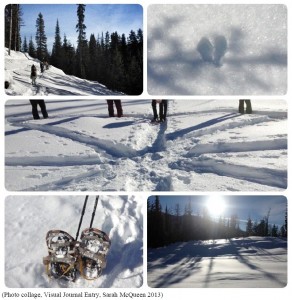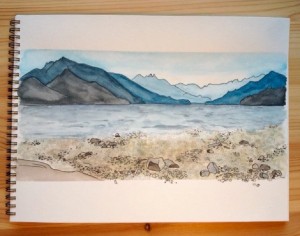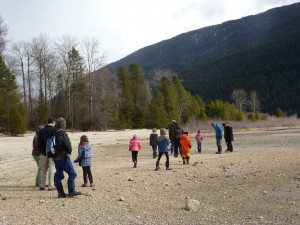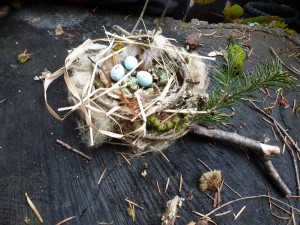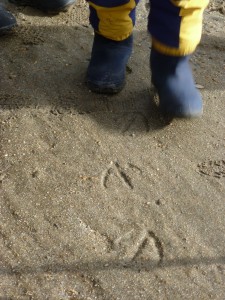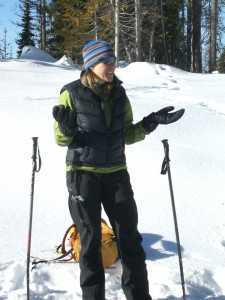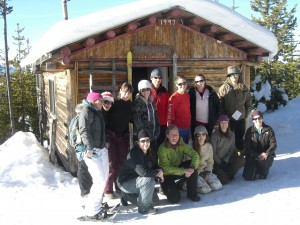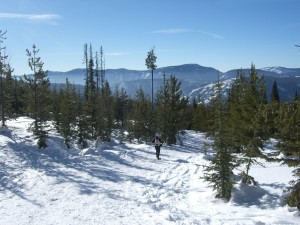A big welcome to the 2013-14 cohort of the West Kootenay Teacher Education Program! The new class of 20 students started yesterday with an orientation and luncheon to kick off the year. We have 11 secondary candidates and 9 elementary candidates who are excited and ready to go, and we look forward to working with them throughout the year.
Rural Reflections #6
To the Stars: Rural Education in the West Kootenays
When I was young, my family and I would make our pilgrimage every summer to our family’s cottage in the Howe Sound of British Columbia. Every night, when it was finally dark enough, my cousins and I would slip out into the dense rain forest surrounding our cottage and head for the giant field in the middle of the island. There, we would spread out a sea of blankets on the still-warm grass and gaze into the heavens for hours until, finally, we were called back home by our parents. Having all been raised in large cities, my cousins and I were fascinated by the wondrous spectacle that lay beyond the noise and ambient light of the city; it was only when we left the distractions of the city behind that we were able to truly see the brilliance of the starry night sky.
In life, brilliance is often clouded by distractions, or might hover just beyond sight. The same is true of brilliance in education. While it is a field that is continually growing and evolving, it happens that the act of educating often becomes clouded with distractions, and the proverbial ambient light of educational organization and politics dims the brilliance that lays within those of us who are truly passionate about instilling in children a zest for learning and for life. For many schools and teachers in the West Kootenay region of British Columbia, however, passion for educating is evident through their attitudes and practices. Much like the stars I saw every summer night as a child, brilliance in education shines in the West Kootenay’s.
Teacher candidates of the West Kootenay Teacher Education Program (WKTEP), based in Castlegar, were given the opportunity during the 2012-2013 year to investigate the nature of rural education by observing a number of schools. Over nearly a dozen observation days, WKTEP students (myself included) traveled to Nelson, Trail, Rossland, Edgewood, Burton, New Denver, Blueberry, Robson, and Crawford Bay to see the brilliance that rural schools emanate.
Rural schools, much like rural school teachers, wear many hats to suit local needs. Rural schools such as Blueberry, Robson, and Crawford Bay have taken their respective communities into consideration in the planning and growth of the schools. Both Blueberry and Robson hold the status of community schools, and thus bring programs into their communities which may otherwise have trouble finding a home. From ArtStarts programs to acting as venues for local meetings, these schools have grown with their communities and act as integral local community members. Crawford Bay Elementary Secondary School, on the east shore of the Kootenay Lake, opened its brand new doors in 2009 after years of petitioning and community fundraising. Helping to raise $800 000, the community now has access to the gym facilities, an early childhood centre, and three community-use rooms within the building. The mutually beneficial relationship developed through the establishment of this school is a brilliant example of how rural schools interact with their communities.
As teacher candidates, we WKTEPers, as we are known, have been told consistently throughout this program that education as a profession is on the verge of revolution. And from what we have observed from schools across the region, this certainly seems to be true. The days of lecturing and note taking, at least in K-12 schools, appears to be drawing to a rapid conclusion. Instead, the level of innovation in these rural schools is truly amazing to witness as teachers give their all for benefit of students who are growing up learning how to think and how to learn, skills that will serve them throughout their life. While teaching reading, writing, and ‘rithmetic are certainly important, teaching these subjects in ways that will give kids the skills they need to navigate life should be on the top of our priority list as teachers.
The K-2 class at Edgewood integrates all subject disciplines with outdoor education through their ‘Walking Wednesday’ program, giving kids the skills they need not only to tackle a math or science problem, but the skills to live in a rural community nestled in the mountains. Lucerne School in New Denver dedicates a week each year for a filmmaking unit for the senior students, giving them ‘real-life’ experiences and opportunities they would not otherwise find in small communities. Even in larger centres, the concept of dedicating a week to a single project may send shock and terror through some. By increasing cross-curricular, project-based learning in schools, we teach these kids how to problem solve, how to think for themselves, and how to find solutions that work for them instead of simply teaching an algorithm that will be forgotten within minutes. As rural schools commit to ideas and projects like these, though, they are not only providing shining examples for other schools to follow, but are showing their students how to shine brightly as well.
As a pre-service teacher who has chosen a life of teaching in rural areas, being exposed to revolutionary and innovative practices in the West Kootenays has been eye-opening and inspiring. As I find myself once again leaving the city behind, and once again making that pilgrimage to the quiet and peacefulness of smaller areas, I find myself feeling much like I did as a child laying on blankets in a field in the middle of the night; I find myself in awe of the shining examples to be found in this region. This time, though, I don’t need to wait for the cover of darkness, I need only look to my colleagues and peers to find true brilliance.
Lindsay Tizzard, WKTEP Teacher Candidate, 2012-13
Rural Reflections #5
Place Conscious Learning and Student-Led Inquiry
I have experienced rural education from both a student’s perspective and a teacher candidate’s perspective. As a UBC West Kootenay Teacher Education Program student, I have had the opportunity to observe rural teaching in BC classrooms from Edgewood, to Crawford Bay. Each visit was met with welcoming and eager teachers and genuinely enthusiastic students. Without exception, it appeared that each student truly wanted to learn and be at school. Stunned by the overwhelming student enthusiasm, I began to search for reasons that could help me better understand how the teachers in small, rural schools were able to successfully foster enthusiasm for learning and school in each of their students. Although, each classroom I visited involved different teaching strategies, I noticed common threads between each classroom. These threads included adventurous teachers who truly love what they do and who are willing to take risks, and serve as compassionate guides. As such, they facilitate students’ learning through place-conscious learning and student-led inquiry projects.
My observation in Terry Taylor and Gary Parkstrom’s Grade 10 to 12 English and History 12 classes at Lucerne Elementary-Secondary School, located in New Denver, BC, provided me with a glimpse into how to foster student enthusiasm for learning and school. It is my belief that rural schools provide teachers with a greater opportunity to get to know each student both inside and outside of the classroom. Having spent time to get to know their students, Terry and Gary identified their students’ keen interest in filmmaking and passion for making a difference. With this information in mind, this team of teachers set out to develop a cross-curricular project centered on the theme “a place of peace and belonging.” Using this central theme, students developed an inquiry, connecting their investigations as to what makes the world a better place. More specifically the students looked at what makes New Denver and the Slocan Valley special for so many different groups of people. With the help of grant money, Terry, Gary and their students were able to collaborate with Vancouver-based documentary film makers Moira Simpson and Lisa Nielsen to develop short documentary films to answer their inquiry focuses and demonstrate their learning.
To successfully complete the project, students ventured into their community and connected with several community members who could help them answer their inquiries. The enthusiasm students showed for this project was evident because they arrived well before the start of the school day, worked through their breaks, and continued their work after school without complaint. Furthermore, when I spoke with students about their films, it was obvious they were passionate and knowledgeable about the subject matter and project process. Once the films were complete, the school opened its doors for a public film viewing. This viewing furthered the learning process of each student because they had the opportunity to share their learning with the community, express their gratitude towards the community members who assisted them with their projects, and further advance the already healthy relationship between the school and the community.
Although this film project only illustrates one way in which teachers can use their passion for teaching, willingness to take risks, and ability to serve as compassionate guides who facilitate student learning through place-conscious learning and student-led inquiry projects, it is now apparent to me how important each of these components are in fostering enthusiasm for learning and school in each student. These components also allow teachers to better connect the curriculum to student’s interests, and improve students’ ownership over their education by matching their teaching practices to student interests.
It is my hope, as a future teacher, that I too will be able to share my enthusiasm for learning by integrating place-conscious learning and student-led inquiry projects into my teaching practice, so that I can foster enthusiasm for learning and school in each of my students.
Melissa Dalgaard, WKTEP Teacher Candidate, 2012-13
Rural Reflections #4
Outdoors With Monica Nissen
We have had the pleasure of having Monica Nissen, Wildsight’s education program manager lead us in the ‘Get Outdoors’ and ‘Below Zero’ programs. After returning from our winter break we got outdoors for a day of snowshoeing at Strawberry Pass near
Rossland. The day was full of educational activities and of course lots of snow!
Sarah McQueen, WKTEP Teacher Candidate, 2012-13
Rural Reflections #3
Two Student Teachers’ Perspectives
Studying and practicing to become a teacher in one’s hometown is a dream for most people who grow up in a rural area. Miranda Bella and Stephanie Mervyn are two student teachers living this dream. Miranda and Stephanie are attending the West Kootenay Teacher Education program at Selkirk College in Castlegar, BC. The West Kootenay Teacher Education Program allows these students to graduate with a UBC Education Degree, all while reaping the benefits of living in their hometown. Miranda and Stephanie grew up together and both graduated from J.L. Crowe Secondary School in Trail, BC. They both highly value their education and upbringing in this rural community, and have now returned to share their values with future generations, and teach in their hometown.
While studying at WKTEP, the girls enrolled in EDCP 331 – a social studies course aimed at Elementary School Teachers. Miranda and Stephanie are both in the Secondary cohort, but took this course as an elective. Within this course, they were able to visit many rural schools in the West Kootenays, including Lucerne School, Edgewood, Crawford Bay, as well as attending a Pro-D day in Burton. The community that was established within these schools was phenomenal – each school was filled with mature students and remarkable educators who all shared a very close bond. At Lucerne School, Miranda and Stephanie observed blended learning in action and felt right at home throughout their entire visit. All of the students were so close with one another and the teachers played an integral role in building community within the school. The older students seemed to play a mentor/mentee role with the younger students, which made this school community so unique and special. There was a major emphasis on place consciousness and understanding the community of New Denver, and each student graduated from this small school with great leadership for future careers, and many other lifelong skills.
The experience of visiting these rural communities and their schools has been invaluable for Miranda and Stephanie. Each field trip has provided the girls with a new and fresh perspective on rural education. Not only do Miranda and Stephanie benefit from gaining perspectives of those who live and work in the area, but they are fortunate enough to be surrounded by close friends and family during an intensive yearlong program. The benefits are endless!
Miranda Bella and Stephanie Mervyn, WKTEP Teacher Candidates, 2012-13
Rural Reflections #2
Inspiring Unique Moments of WKTEP:
Sarah’s Visual Journal Entry: New Denver Beach
The inland waterfront in New Denver was a pleasant reminder for me of home on the
coast with the large mountains, dark waters, and a rocky shoreline. Our first visit to New
Denver was an overnight stay on our way to a professional development day with School District 10 (Arrow Lakes) held in Burton with the energetic and motivational duo, Judy Halbert and Linda Kaser. Our second visit was passing through it on our way to and from Edgewood Elementary School, staying overnight in Nakusp before returning the next day. We went to New Denver two more times to visit Lucerne Elementary Secondary School facilitated by Terry Taylor. Once to observe the multi-age classes and the second time to visit the secondary students as they were working with filmmakers to make documentaries in an ArtsStarts grant program.
Sarah McQueen, WKTEP Teacher Candidate, 2012-13
Rural Reflections
This is the first post in a series of student reflections about living and teaching in a rural setting.
Learn ~ Live ~ Love … Lucerne
Do parents really move from across BC to the tiny Kootenay village of New Denver on the placid shores of the Slocan Lake so their children can go to Lucerne School? Apparently, though the numbers are small, the answer is yes, and for good reason. As a student teacher I am absolutely enthralled by what this small, but far from modest, rural school offers its students.
For the past four years Terry Taylor’s secondary English students and Gary Parkstrom’s Social Studies students have spent a week each year making documentaries under the expert guidance of award-winning, Vancouver filmmaker Moira Simpson. This is place-based learning at its best. The subject matter has ranged from the story of the Doukhobor – Russian émigrés who settled in the area – to an examination of the internment of Japanese Canadians in New Denver during the Second World War. This year’s project: “A Place of Peace and Belonging” – a look at the unique culture of the valley the school is set in which is home to many US war resistors, pacifists and individuals of every persuasion.
The Grades 7 to 9 all get to study Outdoor Education. It is also available as an elective for Grades 10 to 12. It includes all the life skills one might need in the wilderness (with a little bit of recreation thrown in for good measure) like First Aid, Mountain Survival Skills, Canoe and Kayak skills, Mountain Biking and Parks and Recreation Management. During the week-long Fall and Spring into Learning events each year, at least one of the choices is an outdoor environmental experience. Students can choose from glacier hikes, paddle the lake, study “Mountains as Teachers” across cultures and history, or learn to about fish and wildlife in different ecosystems — all on the doorstep of the school.
Then there is just the sheer range of subjects available or as Lucerne says on its website, “No matter what course the student needs, we can find a way to offer it!!!” So maybe that is what impressed me most … the can-do attitude of the school, of the teachers, of the students and of the parents. Lucerne School is a community of leaders, learners and friends. No more, and certainly no less.
Jane Hicks, WKTEP Teacher Candidate, 2012-13
B.C. Provincial Debate Championships
The Debate and Speech Association of British Columbia held its annual provincial championships, the Law Foundation Cup, in the Kootenays this year, and many of our UBC-WKTEP students were there to help judge. Hosted by J.L. Crowe Secondary School and St. Michael’s Catholic Elementary School, the event was an amazing success. Thanks to Marilyn Lunde, one of the tournament’s coordinators, for inviting our students to take part. Check out an impressive video of the event here:
https://www.youtube.com/watch?v=o4013NwVOh8
Young Naturalists Activity
In February, several of our UBC-WKTEP students volunteered with the Young Naturalist Club of Nelson. Students were engaged in planning and leading outdoor activities for elementary aged students and their families. The event took place at Kokanee Creek Provincial Park just north of Nelson. Many thanks to Linda Homeniuk and Monica Nissen for supporting our students with such exciting and meaningful opportunities.
Wildsight’s Below Zero Winter Program
UBC-WKTEP students got out of the classroom yesterday and into the great outdoors, taking part in Wildsight’s winter outdoor education program, Below Zero. Facilitated by education program manager Monica Nissen, the experience helped our students to learn about local flora and fauna as well as winter safety and survival. They were also challenged physically as they snow-shoed into Strawberry Pass near Rossland’s Red Mountain resort and took part in a variety of games and activities in the deep snow.


